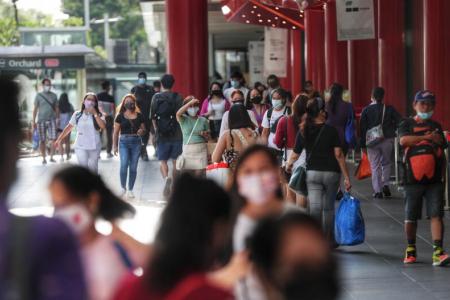Daily Covid-19 cases likely to exceed 1,000 soon, next 2-4 weeks crucial for S'pore
The sharp rate of increase in local Covid-19 cases is worrying and the next two to four weeks will be crucial in terms of whether higher infection numbers will lead to more serious cases and deaths, said Trade and Industry Minister Gan Kim Yong on Friday (Sept 10).
The average daily number of Covid-19 cases has risen from 76 two weeks ago to 288 in the past week. The Health Ministry (MOH) expects this figure to exceed 1,000 soon, with more cases picked up through intensified testing.
Addressing reporters at a press conference, Mr Gan noted that many people have asked if the Government is going back on its plans to reopen the economy despite Singapore's high vaccination rates. About 81 per cent of the population has been fully vaccinated.
These concerns arose after Finance Minister Lawrence Wong on Monday urged Singaporeans to reduce non-essential social activities for the next two weeks as Covid-19 cases spiked.
"While we understand that many prefer a straighter road to Covid-19 resilience, we have said before that we must expect some twists and turns along the way," Mr Gan said. "Given the unpredictability of the virus, we need to be prepared to adjust our plans as we go along."
He added that Singapore will continue to push for higher vaccine coverage, even as it speeds up the rollout of booster shots and steps up nationwide testing.
The country will also adjust its healthcare protocols to cope with the exponential rise in cases, including reducing the quarantine period from 14 days to 10 days from next week as the Delta variant has a shorter incubation period.
A pilot that allows fully vaccinated patients to recover at home will also be expanded from Sept 15.
During the press conference by the multi-ministry task force tackling the pandemic, Health Minister Ong Ye Kung said the experience of other countries has demonstrated that transmission waves typically take four to eight weeks to peak before numbers start to decline, he said.
As Singapore is now 18 days into the current wave, it is likely to see cases increase exponentially - potentially hitting a peak of around 3,000 before it beings to stabilise. But how this actually unfolds will depend on what Singaporeans do collectively - including whether it tests extensively, Mr Ong said.
The higher numbers mean Singapore must be cautious, said Mr Wong, who co-chairs the task force with Mr Gan and Mr Ong.
While there is no need to return to stricter measures, it is also not prudent for the country to press ahead with further reopening measures, he added.
"During this period, especially when we are in the midst of an exponential rise in infection cases, that would be a reckless thing to do."
On Friday, MOH's director of medical services Kenneth Mak also gave details of how vaccination can help protect against the worst effects of Covid-19.
For instance, a study by the National Centre for Infectious Diseases showed that vaccinated individuals saw their risk of infection reduced by nearly two times.
And while 0.1 per cent of vaccinated individuals typically need intensive care, that risk is 10 times higher for the non-vaccinated, Associate Professor Mak said.
In the United Kingdom, a spike in cases following the removal of restrictions did not translate into increased numbers of people requiring oxygen support or intensive care, he added.
"We hope that our local experience will be similar," Prof Mak said. "Nonetheless, it will be prudent for us to exercise caution. Now is not the time to celebrate our own version of a Freedom Day - and particularly if you're vulnerable to severe infections or bad outcomes."
Get The New Paper on your phone with the free TNP app. Download from the Apple App Store or Google Play Store now



